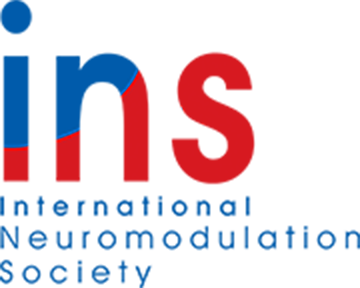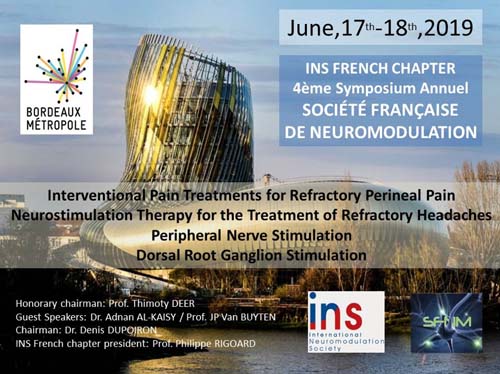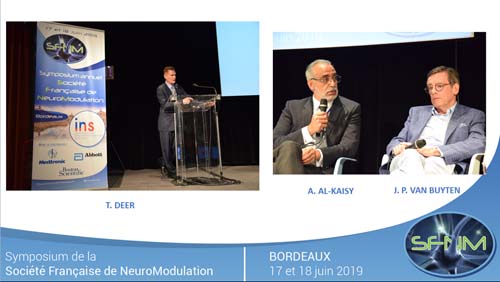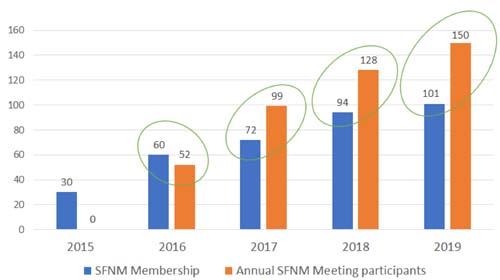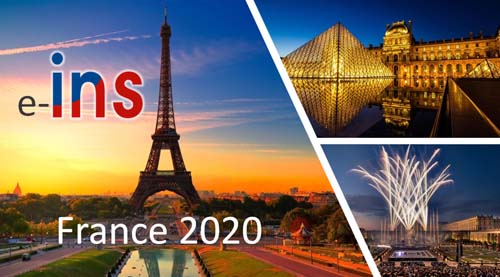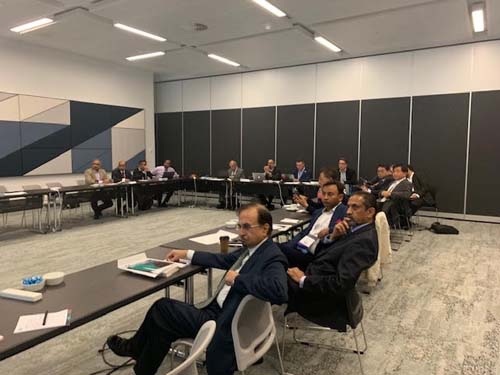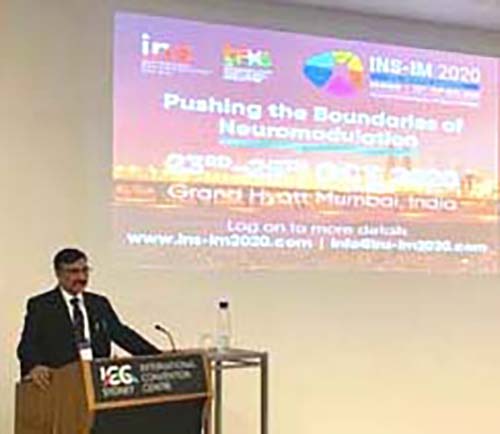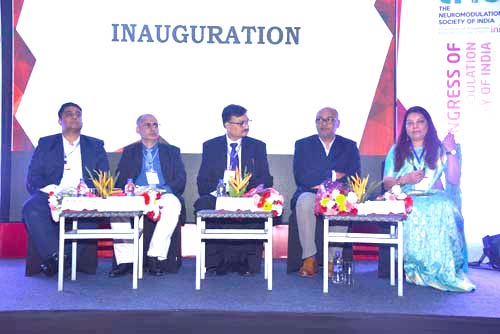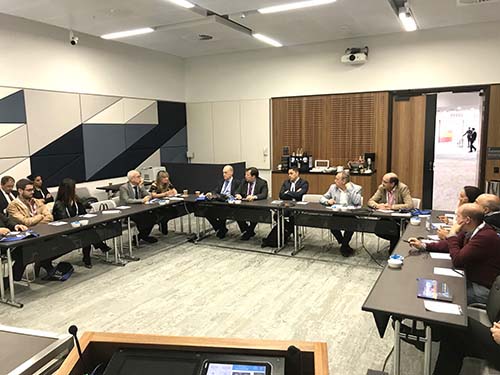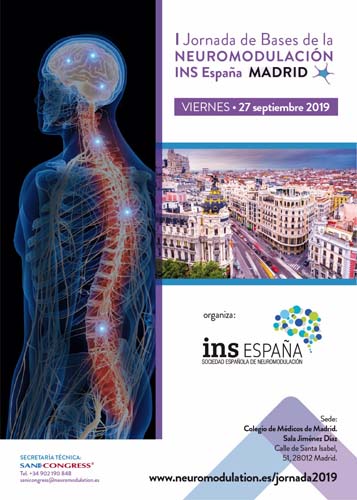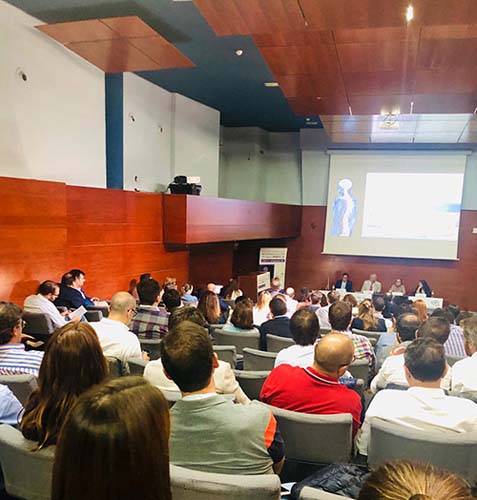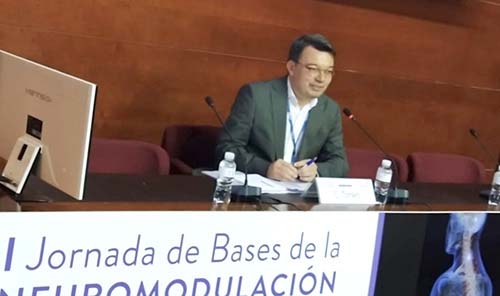 |
  Neuromodulation News: December 2019
President's Message l 2nd Joint Congress of the INS European Chapters l Regional Directors at Large l Plans for the INS 15th World Congress l INS 14th World Congress Abstracts l Wiley's Promotion Tips for Authors l Benefits of Promoting Research Over Social Media l INS Chapter Reports l Ways to Get Involved A Message from the PresidentAs I look back at the first year of my presidency of the INS, I am struck by both the complexity of the challenges that face us and the will of the organization to move forward and demonstrate its premier status in the world of neuromodulation. First, I am amazed by the tremendous amount of work that has been required to bring our society into the 21st century with respect to conflict of interest, gender equality, potential bias and global representation issues. These issues have hampered us in the past, limited the support from our members and industry and differentiated us from societies of more mature medical specialties. Toward these aims, the INS leadership has accomplished the following: (1) Completely revised our conflict of interest (COI) policy. Based upon recommendations made at our most recent meeting, we have worked with an outline that has been adopted by many other comparable medical societies. We have drafted a further document that provides more granularity and specificity with regards to the neuromodulation community. We expect that this document, the final policy revision of this current process, will be adopted at our next vote of the INS Board of Directors. It is a comprehensive, state-of-the-art policy and will serve as a living and evolving document as we move forward. (2) Gender equality has been addressed in many ways including expanding the representation of women on the editorial board of our journal, Neuromodulation: Technology at the Neural Interface and inviting women to become more actively involved in the leadership of the INS. The Women in Neuromodulation (WIN) committee has recently completed a survey of our membership and these important results will be presented in the journal and will help to serve as a guide for the INS going forward. (3) We have systematically investigated and addressed bias at all levels of the society. Our future presidents and editors-in-chief of the journal will be completely divested of any industry interests. The scientific programs of all INS meetings will be closely monitored and cleansed of industry bias. Complete transparency will be required of all INS representatives and officers with respect to their industry ties. The process of providing guidelines for research in neuromodulation is well underway and has addressing and reducing bias as one of its primary goals. We hope that these guidelines will be adopted by all journals publishing neuromodulation studies such that we improve the quality of the neuromodulation literature and allow studies to be effectively compared against each other. (4) The global imbalance of representation on our Board of Directors and Executive Board of Directors has now been addressed by the election of Regional Directors at Large on the Executive Board of Directors. These experienced leaders will have the opportunity to voice the concerns of regional neuromodulators at the highest level of our organization. Elected recently to two year terms are Richard Sullivan (Asia, Australia and New Zealand), Kaare Meier (Europe, Canada, and Africa), Lawrence Poree (U.S.A.) and Fabian Piedimonte (Latin America). Second, and despite the demand to deal with these operational issues, I am pleasantly surprised by our progress on new and important projects to better serve the INS membership. (1) Biennial Journal Strategic Planning Meeting Held at the beginning of November, the journal strategic planning meeting brought together leaders of our field, including Cathy DeAngelis, Eric Buchser, Christopher Gilligan, Richard North, Konstantin Slavin, Eric Wassermann and others to provide critical insights into the future of our journal. Many important issues were addressed and recommendations included improvement of our presence on social media (with the assistance of Georgios Matis), increased representation of women in all aspects of the journal and increasing our publication to 10 issues per year. Our Impact Factor continues to improve and we aspire to become the top ranked journal in our field. (2) Guidelines for Research in Neuromodulation In the effort spearheaded by Richard North and Simon Thomson, we have supported the development of guidelines for research in neuromodulation. A preliminary manuscript has recently been produced and we hope for publication in 2020. Again, this will serve to increase the quality of neuromodulation research, establish standards and allow for comparison between such studies. (3) Guidelines for Education, Training and Practice in Neuromodulation (4) Neuromodulation Centers of Excellence These two projects are integrally linked and continue to produce tangible results. We have had regular meetings of both committees and continue to refine our guidelines for education, training and practice in all areas of neuromodulation. Once defined, these will contribute heavily to the guidelines for development of centers of excellence in neuromodulation. In addition, of course, will be definitions of acceptable outcomes, complication rates, provided services, training, education and data collection. Our committees continue to develop these guidelines and recommendations with completion of their preliminary work scheduled for early 2020 for implementation by the end of my term in September 2021. (5) I would be remiss not to discuss the tremendous progress that has been made in the planning and organization for our upcoming educational conferences. These meetings, in combination with the journal, are some of the most obvious and important products that we produce for INS members. (A) The Second Joint Meeting of the European INS Chapters (e-INS) in Paris at the end of June 2020 has been developed under the tremendous leadership of Philippe Rigoard. The proposed scientific program is of the highest quality and the difficult logistics of the Paris meeting have been finalized in record time with the collaboration of Philippe Rigoard and our collaborators at Kenes Group, Inc. I invite all of you, including non-Europeans, to attend and contribute to this remarkable meeting. (B) The Third Interim Biennial Meeting of the INS will be in Mumbai, India. Paresh Doshi has demonstrated his true leadership by putting together a fascinating program promoting the science and practice of neuromodulation to be held in October 2020. The local arrangements are sublime and the integration of neuromodulation into medical practice within the Indian culture remains a model for similar cultures worldwide. We plan to attend this important meeting and encourage all to follow our lead and experience a truly unique program and venue. (C) Planning for the 15th Biennial Meeting of the INS in Barcelona, Spain (May 1-6, 2021) is already in full swing. Barcelona needs no introduction as an international city of interest. The Centre Convenciones International Barcelona (CCIB), a state-of-the art facility, is only meters from the Mediterranean Sea and within a short walk or metro ride to the heart of the city, important museums and the architecture of Antonio Gaudi. An august, international panel of experts compose the scientific program committee and program planning is already underway. Please stay tuned early next year for a call for session proposals. We hope to welcome you to the premiere meeting of the INS in 2021. (D) The INS is currently soliciting venue proposals for its next congress including the Interim Meeting in 2022 and the Biennial Congress in 2023. We hope that all INS chapters get involved in the planning of these future conferences which are so important to our members. I sincerely thank every member of the INS for their ongoing efforts to support these important projects and the tremendous future of our society and neuromodulation. Robert M. Levy, MD, PhD 2nd Joint Congress of the INS European ChaptersThe 2nd Joint Congress of the INS European Chapters (e-INS 2020) will be held in gorgeous Paris, France on 25-27 June 2020, so start making your plans to join us in The City of Light. Some of the highlights of the cutting-edge scientific programme will be “Pairs on the Podium” debate style sessions that will feature renowned US speakers and their European counterparts. This top-notch congress will also include plenary sessions, a cadaver workshop, a nurses’ session, ePosters viewing, supported symposia and much more. e-INS 2020 preliminary programme At e-INS 2020, you can showcase your latest research, make a difference and get a new perspective about your work. You will have the chance to meet people from a wide range of backgrounds and build your professional network. What is more, you will be able to discover Paris’ mesmerising boulevards, museums and galleries. Key dates to remember:
The 1st Joint Congress of the European INS chapters took place in Nijmegen, Netherlands and was focused on technologies that can help improve patients’ lives. The Congress in Nijmegen attracted well over 600 participants to the event and over 200 abstracts were submitted by participants. We are expecting the 2nd Joint Congress of the European INS chapters to be an even greater success. The Congress is jointly organised by the European Chapters of the International Neuromodulation Society. We are looking forward to seeing you in Paris, France. Chapter Presidents Elect the First Four Regional Directors at Large
We are pleased to announce the election of our new regional directors-at-large (DaL). The positions were created as a way to ensure adequate global representation to the International Neuromodulation Society Executive Council. These regional DaLs will act in an advisory role to provide an international perspective to the council with respect to INS issues and initiatives. The areas comprising each DaL region were grouped together either based on the included areas having geographic proximity, or on their having similar healthcare-system aspects. The regional DaL areas are: Asia / Australia / New Zealand; Africa / Canada / Europe; Latin America; and the USA. Nominees for the positions consist of prior chapter presidents or directors-at-large who are well-experienced with operation of INS. Each chapter president has nominated one regional candidate. All the chapter presidents within each region recently voted to elect their regional DaL. The regions and the newly elected regional DaLs are:
The duties of the regional DaLs will be:
The regional DaL position grants no leadership rights; the role is solely a representative function for providing advice to the INS Executive Council. Regional DaLs assume their roles in December 2019, and serve a single term of two years until a successor is in place. Plans for the INS 15th World Congress
The International Neuromodulation Society 15th World Congress, “Neuromodulation: From Scientific Theory to Revolutionary Therapy,” takes place May 1 – 6, 2021, in Barcelona, Spain. We invite you to join us for a very dynamic, excellent program held at the state-of-the-art Barcelona International Convention Centre (CCIB). The centrally located venue in this world-class city overlooks the beach and is conveniently near a wide selection of hotels and restaurants. Please save the date and follow updates at the INS 15th World Congress website, https://ins-congress.com/ . Reflecting the revolutionary nature of our field, the congress program will emphasize the field’s transformative force on disease treatment. Congress co-chairs Carlos Tornero Tornero, MD, PhD, and David Abejón, MD, are working with the local organizing committee on promotion, logistics and related matters. For a scientific program that is fair, balanced, and free of industry influence, the congress has two scientific program chairs who are completely divested of neuromodulation financial interests: Elliot Krames, MD, and Fabian Piedimonte, MD, PhD. This organizational structure adheres to revision of the INS conflict-of-interest policy. Meanwhile, to ensure scientific rigor, an impressive, diverse, international group of section co-chairs will conduct peer review of proposed content. Please mark your calendars, and plan to join us May 1 – 6, 2021, in Barcelona, Spain! INS 14th World Congress Abstracts are Now Published in Neuromodulation
Abstracts for the International Neuromodulation Society 14th World Congress have been published in the online version of Neuromodulation: Technology at the Neural Interface, and may be cited as follows: International Neuromodulation Society's 14th World Congress: Leading a Global Medical Revolution, Sydney, Australia May 25–30, 2019. Neuromodulation: Technology at the Neural Interface, 2019;22: doi:10.1111/ner.12958. Wiley's Promotion Tips for AuthorsOur journal’s publisher, Wiley, offers a number of ways members can promote their work and content that appears in Neuromodulation: Technology at the Neural Interface, the International Neuromodulation Society journal. For instance, Wiley recommends overall article-promotion best practices in their author promotional toolkit . In addition, the following specific links also serve as resources: Sharing your research:
About conferences and networking:
About creating content:
Please view the strategies outlined in the toolkit https://authorservices.wiley.com/author-resources/Journal-Authors/Promotion/promotional-toolkit.html and plan to implement one or more today! Why Should Authors Engage in Social Media Environments?By Georgios Matis, MD, PhD The number of active social media (SM) users worldwide was estimated in 2018 as over 3.1 billion (42% of the total population) with, for example, 648 million in the Americas, 191 million in Africa, 1.779 billion in Asia-Pacific (17 million of that in Australia), and 448 million in Europe. However, some authors seem still reluctant to get involved in this digital trend. There are some good reasons for that. The organic reach (the number of people who see our post without us paying for it) is nowadays less than before due to changing algorithms. It has been estimated that posting on Facebook is 16 times less effective today than it was six years ago, in part because the posts have to compete against a plethora of social posts in the news feed. In addition, taking into account that an average person spends 2.5 hours every day on SM (=20 work weeks per year), the authors are hardly left with any time to write. The distraction could be too big. The other side of the coin is that more and more authors choose to actively present their papers on various SM. Engagement in social media (SM) is considered by them a part of their job as a physician and not an addition to the current workflow. Why? By promoting their scientific work, they generate a personal brand and develop a professional profile. Their visibility is enhanced so that networking with colleagues of same/similar interests can be broadened. Career development is the result. Moreover, the sharing of information enhances the scientific exchange and contributes to an easier and faster progress of the medical field. A wider audience can be reached in a cost-effective way encouraging scholarly dialog among various health care stakeholders. Podcasts and SM chats are some of the emerging methods to achieve increased engagement of health care professionals for selected papers. With the use of hashtags authors can create lists of colleagues with shared interests (e.g. #neuromodulation) and search for resources tailored to their specific needs. In addition, posting articles on SM could help authors reach national and international professional and patient organizations (and potentially successfully compete for scarce grants as well). Interestingly, institutions have begun implementing the SM portfolio as part of their criteria when considering academic promotions. In the same line of thinking, alternative metrics (altmetrics: a combination of web traffic and SM shares) are being more and more used to capture better the readership impact. It has been shown that tweets on Twitter for example can predict highly cited articles within the first three days of article publication. It has been proposed that such social impact measures could complement traditional citation metrics. SM is not to be seen as a sort of necessary evil. Instead, being part of an outreach strategy, SM helps the users to connect with other readers and cultivate community, connection and conversation with them. Not to forget that there are always content producers or journalists who are constantly looking for interesting stories/people to feature. Being original, sharing short video clips, adding commentaries to a hot topic or creating quizzes are only some tips that could lead to generating interest about the authors themselves and then about their work and their departmental research or clinical enterprise. The “Author Tool Kit” provided by many publishers could also help authors build traffic for an article and make it discoverable by SEO (search engine optimization). To sum up, the promotion of an author’s work on SM should not be seen in a “Publicize or Perish!” context. It is an essential part of the knowledge dissemination process, which is necessary to address the information needs of researchers, clinicians, and patients. It is actually more about “doing more with less,” where it is possible to begin gradually, while observing examples of best practices and keeping always in mind the limitations and the responsibilities that come with the use of SM. In parting, being authentic is the only way to establish credibility and stand out over time in today’s crowded scientific arena. So will you be among those starting or continuing to use SM to share YOUR story? INS Chapter ReportsActivity summaries from: Argentina - Sociedad Argentina de Neuromodulación (SANE)Activities involving SANE in 2019: On September 2019, Dr. Beatriz Mantese - Head of the Neurosurgery Service of Garrahan Hospital and Scientific Secretary of the Argentinean Neuromodulation Society (SANE) coordinated the course Stereotactic Neurosurgery. This theoretical and practical course, took place at the at the Garrahan Pediatric Hospital (City of Buenos Aires, Argentina). It provided basic knowledge for performing neurosurgery with stereotactic technique applied to injury biopsy and injury evacuation, and it was intended for neurosurgeons, anesthesiologists, neurologists, and young specialists who begin to learn neuromodulation techniques. In addition, Dr. Noemi Rosenfeld, President of the Argentinean Neuromodulation Society (SANE), will coordinate the I° Meeting of the INS Latin-American Chapters. This regional meeting will take place in conjunction with the Latin American Summit of Functional Neurosurgery, Stereotaxy and Neuromodulation on December 5 to 7 at Mendoza Province, Argentina. Under the auspices of the Argentinean Neuromodulation Society (SANE), the following events occurred during 2019:
Australia and New Zealand - Neuromodulation Society of Australia and New Zealand (NSANZ)The Neuromodulation Society of Australia and New Zealand (NSANZ) has had another hugely successful year, if not challenging at times due to the rapidly changing environment. This is when you really begin to experience the benefits of an association such as ours and the support of the International Neuromodulation Society (INS) on a much larger scale. After hosting the 14th International Neuromodulation Society (INS) Congress, Neuromodulation: Leading a Global Medical Revolution in Sydney it was an honour to showcase the huge growth and major developments from recent years to our international colleagues and the world of neuromodulation. The conference was held over 25-30 May 2019 at the International Convention Centre (ICC), Sydney and was a very successful meeting on all fronts with 1,241 participants for 42 countries. The feedback was excellent, will all very impressed with the enthusiastic support of the local organising committee of Dr. Paul Verrills, Dr. Richard Sullivan, Dr. Philip Finch, Dr. Alan Nazha, Dr. Murray Taverner, Dr. Frank Thomas, Dr. James Yu and myself and the congress scientific program chair Dr Marc Russo. On Saturday 25 May 2019, in conjunction with the INS Congress, NSANZ ran a Cadaver Workshop at Macquarie University on Radiofrequency Procedures, which proved very successful. A total of 64 delegates attended the workshop which was at capacity. The program ran for one day with two sessions, a Basic Skills Session in the morning and an Advanced Skills Session in the afternoon. The workshop focused on the radiofrequency ablation technique of the spine (lumbar, thoracic, cervical), pelvic and sacroiliac joint. Radiofrequency technique for craniofacial pain, hip and knee along with sympathetic plexus was also demonstrated. Planning is well underway for the NSANZ 14th Annual Scientific Meeting “Neuromodulation, Value Based Care” to be held 8-9 August 2020 at the Sofitel Brisbane Central, Queensland, with the ever-popular Cadaver Workshop being held 7 August at QUT Medical Engineering Research Facility, Brisbane. NSANZ membership has grown from 39 members in 2016 to 99 members in 2018, to 127 now which is a 225% growth over the past 3 years. The Australasian Neuromodulation Nurses Special Interest Group (ANNSIG) was also introduced. The NSANZ Board is continually improving its offering for its members and associates and is meeting on 29 November in Melbourne for our annual strategic planning session to focus on its outcomes and goals for the next 4 years with a strong focus on relationships and alliances, membership engagement, NSANZ website development, education and cadaver courses, policies and documents. The Board along with the assistance of several medical technology companies, and public relations companies developed a campaign to lobby against the Australian Government’s proposed changes to Private Health Insurance coverage that would restrict access for in-patient procedures for chronic pain (and would only be available to patients with top health cover from 1 April 2019). The campaign has been successful to date with much media coverage quickly expanding the profile of NSANZ and spreading the message on neuromodulation: benefiting thousands of patients a year globally. Lastly, sincere thanks to my friends and fellow board members Dr Marc Russo, Dr Richard Sullivan, Dr Murray Taverner, Dr James Yu, Dr Philip Finch, Dr Mo Awad, Ms Christin Bird, Dr Matthew Keys and Ms Megan Hannah for being so committed to the growth of neuromodulation in Australia and New Zealand. We have much work to do and are focused on our mission:
Dr Nick Christelis Brazil - Sociedade Brasileira Neuromodulação (SBNM)After the great success of the Interim Meeting, held in Rio de Janeiro in 2018, the Brazilian INS expanded and struggled into a more professionalized group, keeping in mind some important goals. Despite the distance, a dozen doctors went to Sydney to the INS World Congress from 25-30 May, 2019. Both in Sydney and afterwards, the Brazilian Board of Directors has strengthened a close relationship with foreign countries, especially with Latin American countries like Argentina, Colombia and Chile. As a result, a Latin American meeting is scheduled to be held in Mendoza, Argentina, from 4 to 7 December, where members from Brazil will meet not only Latin American professionals but also foreign members such as Dr. Robert Levy, Dr. Konstantin Slavin and Dr. Dirk de Ridder, among others. In Brazil, INS is supporting many courses, symposiums and congresses all around our country, in order to spread knowledge of how neuromodulation can help people in their quality of life. From August, 2019, a new Board of Directors has started their activities keeping in mind the important task to improve the quality of Neuromodulation in our country and around the world. The new Board is composed of the following members: - Dr. Daniel Benzecry Almeida: President - Dr. Alexandre Amaral: Vice-president - Dr. Hougelle Simplicio: Secretary - Dr. Bernardo de Monaco: Scientific Director - Dr. Kleber Azevedo: Treasurer Canada - Canadian Neuromodulation Society (CNS)On behalf of the Board of the Canadian Neuromodulation Society (CNS), I would like to update the INS on our activities this year. The 11th annual meeting of the Canadian Neuromodulation Society was held June 30-July 2, 2019 in Iqaluit, Nunavut. The meeting was held in the far North of Canada to bring attention to the fact that this population is still underserved in the area of neuromodulation. We had discussions with the Mayor of Iqaluit and the Minister of Health for Nunavut. Sixty delegates attended, with representation from all provinces in Canada and attendees from Sweden, Russia, Switzerland, and the US. The invited Tasker lecture was given by Dr. Andrew Parrent on “Spinal cord stimulation for PD gait”, the Kumar lecture was given by Professor Bengt Linderoth on “Spinal cord stimulation for pain”, and the CNS lecture was given by Dr. Andrey Sitnikov on “What happened to thalamic DBS for pain?” The CNS has forged links with the Canadian Anesthesiology Society as we share many similar goals in the treatment of pain. The new slate of Board members recently elected reflects this growing participation of anesthesiologists in our Society. The Society has been working closely with Parkinson Québec to support lobbying in that province for better access to neuromodulation. The recently published CanADA study (Can J Neurol Sci (2018) 45:553-8) showed that province was statistically below the rest of the country in access to DBS. Our Treasurer, Dr. William McDonald, has worked with our accounting firm to ensure our bylaws and constitution are in keeping with the new Canadian laws on non-profit organizations. Our budget is in a healthy surplus. Our next national meeting will be held September 11-13, 2020 in Kelowna, British Columbia. I hope you will consider joining us. With respect, Dr. Christopher R. Honey, MD, DPhil, FRCSC, FACS Canadian Neuromodulation Society board members: Keith MacDougall, MD, FRCSC - President France - Societe Française de Neuromodulation (SFNM)Activities of the French INS chapter, Societe Française de Neuromodulation (SFNM): - Intrathecal Drug Delivery Symposium, D. DUPOIRON hosted by SFNM, 28th and 29th January 2019, Angers - 4th Annual meeting of the French chapter (SFNM), 17th and 18th of June 2019, Bordeaux Interventional Pain Treatments for Refractory Perineal Pain / Neurostimulation Therapy for the Treatment of Refractory Headaches / Peripheral Nerve Stimulation / Dorsal Root Ganglion Stimulation
2020 - The 2nd European INS-Chapter Meeting in Paris, France, June 24-27, 2020 https://e-ins.org/
India - The Neuromodulation Society of India (TNS)It gives me great pleasure to share developments and activities of The Neuromodulation Society of India (TNS) from 2019, which include several noteworthy events and upcoming opportunities to collectively share information about our growing field to audiences within our national boundaries and beyond. International Neuromodulation Society Interim Meeting, 2020 (INS-IM 2020) On 29th May 2019 a special meeting with INS leadership and international advisory board members was held in Sydney to discuss the planning of INS-IM2020. There, TNS representatives also presented the preparations done until then to the Board of Directors of the INS and the INS-IM 2020 Advisory Board.
We were pleased to receive positive feedback and suggestions about INS-IM 2020 planning, as well as an expression of confidence stemming from the prior experience of the WSSFN 2015 interim meeting that our team had previously organized in Mumbai in 2015. Based on the feedback and inputs from all the committee members, it was decided that we would consider topics relevant to the local geography and development of the neuromodulation therapies in the region. Some of these included, but are not limited to, having a cadaver workshop, satellite lesioning workshop, neuromodulation programming workshop, etc. Another unique feature of this program will be the participation of leaders in several relevant key specialties, such as neurology and psychiatry, to name a few. Keynote talks serve as an anchor for the program. We have planned six keynote talks, which are unique and engaging, and are sure to form the main attraction of the program. We have had an unprecedented interest in the meeting and have more than 40 international faculty and 50 Indian faculty already confirmed. We are now sending out further invites to interested speakers for the program. If you think that you can contribute to the scientific program of the meeting, please write to us at [email protected] . India is known for its hospitality, and we would like you to experience it at its best. The conference registrations will cover everything from workshops to a gala dinner! There will be a feast of cultural programs and special engaging activities for accompanying companions during the meeting, which will give them flavor of Indian culture. We are sure that this will be a memorable experience for all. The registration site is already open and it is advised to register early as more than 60% rooms have been blocked (crossed 200+ registrations!). The organizing committee looks forward to welcoming you to India. The Neuromodulation Society (TNS) of India The Neuromodulation Society is growing rapidly; we have now 60 life members and 27 active members (fully contributing members to the INS), encompassing neurosurgeons, pain physicians, psychiatrists, neurologists, anaesthesiologists and urologists. The membership is growing strongly and we should be touching 100 members by this year-end. From 9th-10th November we conducted our first annual scientific meeting. The board selected a meeting location in Guwahati in Far East India, where awareness of neuromodulation has been lacking, so that this event could stimulate interest in this field. The meeting announcement noted the TNS “is well-known for its meticulous planning, team work and dedication for any such event,” and the program attracted 225 registrants. The scientific program of the TNS first annual meeting is online at: https://ins-im2020.com/img/tns-scientific-program.pdf .
More details about the society, its newsletters and activities can be obtained from our chapter page on the INS website, https://www.neuromodulation.com/india . Signing off, Dr. Paresh Doshi Italy - Italian Neuromodulation Society (Capitolo Italiano INS)The Italian chapter activities in 2019 were the participation in the INS World Congress in Sydney and the next National Congress in Florence, 21-23 November, 2019. Nordic - Nordic Neuromodulation Society (NNS)The Nordic Chapter held its 6th Annual meeting in Aarhus, Denmark, in early October (http://nordicneuro.org/). Despite tightening rules for industry support of conference participants, the meeting attracted over 100 delegates from all over the Nordic region who could enjoy a very diverse scientific program featuring brilliant speakers from Denmark, Finland, Germany, The Netherlands, Sweden, and United Kingdom.
This year’s meeting marked a change from previous years in several aspects:
- Two full days with scientific program. - Two parallel pre-meetings in the afternoon before the main congress, concentrating on Nurses in Neuromodulation (hosted by Anne Lene Høst Knudsen, RN) and Nordic Research Collaborations (hosted by Kliment Gatzinsky, MD PhD, and Terje Kirketeig, MD PhD). - More focus on nursing aspects in the scientific program. - Prizes for best Flash Talk (winner: Ashish Gulve, UK) and best poster (winner: Dennis Poulsen, DK). - Full inclusion of sacral nerve modulation in the scientific program.
On behalf of the Organizing Committee and the Society, I would like to thank our speakers, exhibitors, and participants for making this yet another very successful meeting.
Special thanks go to The Lundbeck Foundation for their generous support of the meeting – and in particular to the members of the Organizing and Scientific Committees for all the work and talent they put into it.
In June 2020, the Nordic chapter is happy to support the Second Joint Congress of the INS European Chapters hosted by the French chapter.
The Nordic chapter currently has 85 members from four countries, and the 6th meeting will end with a positive balance, keeping the Society financially stable.
We look forward to see the results of the initiatives established at the pre-meetings, and to enjoy a closer collaboration with our colleagues working with SNM.
Finally, the Nordic chapter has seen a change in leadership. I have been president of the chapter since its foundation in 2014 but due to my recent election as INS Regional Director-at-Large, I have resigned as president of the chapter.
A unanimous board has decided to elect Kliment Gatzinsky from Sahlgrenska, Göteborg, Sweden, as the new president of the Nordic chapter.
It has been a true privilege to work as the chairman of the chapter and seeing it grow and mature, and I am very happy to leave the organization in such qualified hands.
On behalf of the NNS board Kaare Meier, Denmark
North America - The North American Neuromodulation Society (NANS)The following is a synopsis of NANS accomplishments during 2019. NANS started 2019 off strong by hosting a successful 22nd Annual Meeting. From January 17-20, 2019, over 3,000 total attendees joined us in Las Vegas to learn about the latest developments in our field. David Provenzano, MD, was the principal architect behind the scientific program for the Annual Meeting and his efforts allowed the meeting to surpass all expectations with content that was current, engaging and innovative. As previously mentioned, NANS was engaged in a public relations initiative, which was first centered in the state of California and soon was rolled out to a wider audience nationwide. Through our efforts, we were able to introduce the next phase of the program promoting neuromodulation as an alternative to opioids. Part of these efforts resulted in the creation of the Ask About Pain website (www.askaboutpain.com) for patients and practitioners. It is estimated that via this campaign, we have been able to transmit our message about alternatives to opioids to over 19 million individuals. NANS also contributed to an article that was published in USA Today touting alternatives to opioids. In early August, the NANS Board met for our annual board retreat in New Orleans, LA, USA. While together, we reviewed the progress of our yearly initiatives and discussed several of our strategic planning initiatives. NANS will shortly begin work on several governance projects intended to improve the overall operations and functioning of the Board and Committees. In January 2019, NANS partnered with several of our major supporters with the Consumer Electronics Show (CES) and our industry partners to showcase neuromodulation as a growing therapeutic field among other rapidly-growing medical technologies. We conducted a panel discussion in front of over 700 attendees and had an exhibit booth in the exhibit hall. Due to the positive feedback received, we are going to be partnering with the CES again in January 2020. As previously mentioned, 2019 marks the 25th Anniversary of NANS. We have several more updates coming as well as some acknowledgements we will be making in honor of this at the upcoming 2020 Annual Meeting. B. Todd Sitzman, MD, MPH Russia - The National Neuromodulation Society in Russia (NNSR)The National Neuromodulation Society in Russia (NNSR), Interdisciplinary Medicine Association (IMA) and European League Against Pain held the 10th International Interdisciplinary Congress «Manage Pain» in Moscow, Russia, from November 14-16, 2019. «Manage pain» was initiated in 2009 and became most successful interdisciplinary annual congress on the topic of pain in Eastern Europe. The congress is held in Moscow every autumn and gathers doctors of different specialties as well as leading researchers and experts. In 2018 more than 3,000 participants were registered at the congress. The last day of congress (Nov.,16) had interesting reports from interventional pain management specialists (USA, Ireland, Israel, and India). On 17th Nov. was a «workshop» in the format of an «open mic». The congress is organized by European League Against Pain in cooperation with Interdisciplinary Medicine Association. The aim of the Congress is to disseminate knowledge continuously provided by leading international experts to clinicians and to stimulate network-building among pain scientists and pain clinicians in Europe. The second congress of the NNSR will in St. Petersburg! The congress will be held Sept. 11-12, 2020. We have asked for participation in making a program: inviting ideas about possible presentations and desired topics, offers of panelists and others. We made an online questionnaire for convenience of providing this input: https://forms.gle/hYLGSjWUvUZ8P4Bk7 . We look forward to receiving ideas! Finally, the NNSR is also still planning a section on functional neurosurgery with neuromodulation at the Pan-Asian Congress in May in Kazan. Spain - the Spanish Chapter of the INS- Update of the INS Spain website. The INS Spain website has been completely renewed. www.neuromodulation.es New sections for professionals and for the general public are included. - Activation of social networks: On Twitter as INS España, @EspanaIns - Meeting of the Ibero-American INS Neuromodulation Working Group in Sydney, May 27, 2019 at the International Exhibition Center during the INS 14th World Congress. Assistance from different professionals in Latin America, whose link is the Spanish language. This group is created with the aim of generating synergies in relation to neuromodulation.
- Teleconference of the Ibero-American Working Group. September 11, 2019. Directed by Dr. Carlos Tornero - Congress on Foundations of NEUROMODULATION Madrid, September 27, 2019. Topic: Know what are the mechanisms of action of neuromodulation The conference was organized around five subject areas: Deep brain stimulation, anatomical and electrical basis of the functioning of spinal neuromodulation, neuromodulation indications and programming. And a last topic opened a debate on the future of neuromodulation. Attendance: more than 100 persons attended from different health specialties: neurosurgeons, anesthesiologists, neurologists, physiotherapists ... It was an interesting day of debate and update of neuromodulation as a therapeutic option in different pathologies. In addition, this congress had the largest attendance in the history of the Spanish Neuromodulation Society, which demonstrates a great interest in these techniques.
- Sponsorship INS Spain of Scientific Activities related to Neuromodulation: - V Teaching Practical Course on Cadaver of Intervention in Pain ”. Department of Anatomy of the Faculty of Medicine. Universidad Autónoma of Madrid. February 28 to March 2, 2019. Organized by: Dr David Abejón
- I Congress of Wireless Neurostimulation. Faculty of Medicine UCV (Universidad Católica de Valencia) San Vicente Martir. Valencia, March 1-2, 2019. Organized by: Dr Emlio Llopis.
- Congress Technoforum Oncology Pain. Pontevedra, October 25-26, 2019. Organized by: Dr Pablo López País.
UK and Ireland - Neuromodulation Society of the UK and Ireland (NSUKI)NSUKI recently arranged its ASM in Leeds from the 16rd to the 17th November. This attracted 170 delegates with 10 exhibitors. A pre-course cadaver workshop and an allied health care team meeting (SNNAP) was held at the University of Leeds on the 15th November 2019. This had 24 delegates for the hands-on workshop. The allied health care team also had an opportunity to place electrodes during the lunch time. This was a very successful addition to the ASM. Bursary to the members of NSUKI has been very successful. We have managed to get 23 bursaries of £3000 to attend the INS meeting in Sydney and nearly 40 bursaries for the Leeds ASM. We are hoping to carry on with the bursaries for both European meeting in Paris 2020 and the INS in Barcelona 2021. The current ASM will have to alternate between UK and possibly along with the European INS. We are in the process of setting up a non-industry based study day possibly on the years that we have the European INS. This will focus on developing and helping services to set up and increase their activity. The Neuromodulation Registry is progressing with more than 75% of the hospitals registered and having useful data. We have more that 1700 entries in the database. Our 3-year term will come to end and we are in the process of finding alternative funding to run the database. The results are presented in the ASM every year. On behalf of the Board and our members may I wish you a Merry Christmas and Happy New Year. Ganesan Baranidharan, MBBS, FRCA, FFPMRCA, PG Dip Anaesthesia If you like what you see and want to become involved in the INS…Join us or renew your membership now! Submit an article to Neuromodulation: Technology at the Neural Interface or get content updates Refer a colleague to INS! Learn about our biennial Congress and Interim Meeting Customize INS patient hand-outs with your contact details Volunteer for an INS committee Visit our Global Events Calendar View our website Expert Panel Discussions Offer unbranded content for the INS Image Bank or YouTube channel See related global initiatives View or join our Public Directory of Members Use our INS Google group for peer consultation, INSForum Follow INS updates on LinkedIn or Twitter Like International Neuromodulation Society on Facebook |
| Last Updated on Monday, November 22, 2021 11:20 AM |
